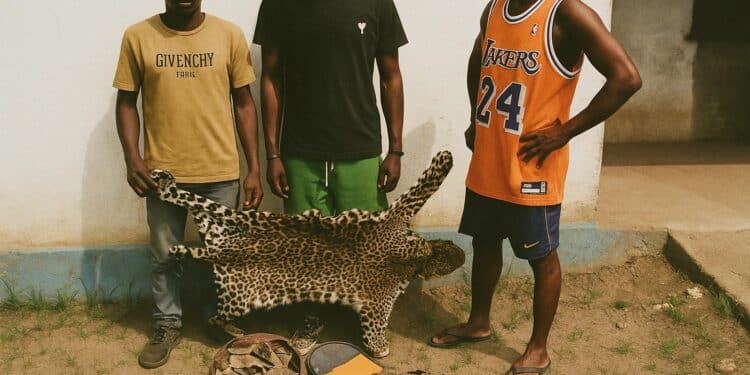Judicial Resolve in the Heart of Likouala
In the humid river town of Impfondo, a courtroom rarely thrust into the global spotlight delivered a judgment that reverberated far beyond the swampy forests of northern Congo-Brazzaville. On 26 June 2025 the Tribunal de Grande Instance sentenced Jodel Mouanda, Arel Ebouzi and Parfait Mbekele to custodial terms of two to three years for possessing and attempting to market a panther skin, a cache of pangolin scales and four claws extracted from the giant species. All three items belong to fauna classified as fully protected under Congolese law. The convicts were further ordered to pay an aggregate fine of one million CFA francs, plus three million in damages.
What might appear a routine criminal case has been interpreted by legal observers as a calibrated signal of the Republic’s readiness to operationalise the 2020 wildlife code and to translate treaty obligations into courtroom realities. “The Likouala verdict demonstrates that the judiciary is not merely reactive but increasingly proactive,” contends Merveille Nkouka, a legal adviser with the Pointe-Noire Bar Association, emphasising that the defendants confessed during open hearings, thereby streamlining proceedings and reinforcing the perception of due process.
Legal Foundations and International Commitments
Congo-Brazzaville is a signatory to the Convention on International Trade in Endangered Species of Wild Fauna and Flora (CITES) as well as the Lusaka Agreement Task Force, thus binding itself to strict regulations on specimen movement. Domestically, Law 37-2020 elevated several charismatic and lesser-known mammals—such as the African leopard (Panthera pardus pardus) and the giant pangolin (Smutsia gigantea)—to the category of ‘integrally protected’. By imposing up to five years’ imprisonment on transgressors, legislators supplied courts with robust punitive tools.
The Impfondo ruling appears to deploy these tools without hesitation. According to Dr. Louis Mombo of the Central African Forest Observatory, “the sentence length, while within statutory limits, balances deterrence with reintegration prospects.” The monetary penalties, he notes, are earmarked for conservation initiatives under the Finance Ministry’s special wildlife account, thereby creating a feedback loop between enforcement and ecological stewardship.
Security, Development and the Regional Equation
Wildlife crime in the Congo Basin is seldom an isolated environmental offence; it often overlaps with informal supply chains that feed trans-border trafficking networks stretching toward Cameroon, Nigeria and ultimately Asian consumer markets. By intercepting the Likouala trio, the gendarmerie disrupted a micro-node in this broader lattice. Officials credit an intelligence-sharing platform jointly operated by the Departmental Directorate for Forestry Economy and the Wildlife Law Enforcement Support Project (Palf) for the swift arrests.
Beyond protecting endangered species, Brazzaville’s strategy also seeks to insulate local communities from the governance deficits that illicit trade fosters. In districts such as Epéna-centre—where the leopard pelt reportedly changed hands—the parallel economy of bushmeat and exotic skins can undercut legal livelihoods, foment insecurity and erode tax bases. The Ministry of Interior argues that harsher sentences will gradually shift the risk-benefit calculus of would-be traffickers, thereby creating conditions more conducive to sustainable ecotourism and foreign investment.
Diplomatic Echoes and the Road Ahead
Foreign chancelleries in Brazzaville quietly applauded the Likouala verdict, viewing it as further alignment with the African Union’s Common Strategy on Combatting Illegal Exploitation of Wild Fauna and Flora. A senior EU diplomat, requesting anonymity, remarked that “consistent jurisprudence builds credibility, which in turn unlocks technical assistance.” Paris and Berlin have already channelled funds into ranger training programmes, while Beijing—keen to demonstrate its evolving stance on conservation—recently provided scanning equipment to detect trafficked specimens at Pointe-Noire’s port.
Brazzaville’s task now is to replicate the Impfondo template across jurisdictions where logistical hurdles are more daunting and magistrates fewer in number. Plans for mobile courts and e-filing of wildlife cases, announced by the Justice Ministry in April, hint at a modernisation drive aimed at harmonising enforcement standards nationwide. Civil-society monitors caution that legal victories must be paired with public-awareness campaigns lest black-market demand simply migrate deeper into the forest. Nevertheless, the combination of political will, judicial clarity and multilateral cooperation evident in this case suggests a trajectory in which the leopard may keep its spots and the pangolin its scales, not as artifacts in contraband satchels, but as living testaments to Congo’s ecological heritage.











































